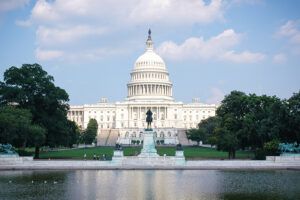A group of Democrats in Washington today provided a response to the burgeoning anti-ESG movement: a congressional sustainable investment caucus.
House Reps. Sean Casten, D-Ill., and Juan Vargas, D-Calif., announced the caucus “to progress past the distortion of facts and have robust, open-minded discussions about sustainable investing,” Casten said in a statement.
That comes as Republicans have increasingly supported an anti-ESG push, largely led by the states, including Texas and Florida, which have started to pull assets away from managers accused of boycotting the fossil fuel industry. That movement is expected to grow, with politicians likely latching onto it as part of a wider anti-“woke” agenda that could be part of campaigns in the 2024 election.
Vargas and Casten are co-chairs of the Sustainable Investment Caucus, whose other initial members are Reps. Bill Foster, D-Ill., Seth Magaziner, D-R.I., Raúl Grijalva, D-Ariz, Brad Sherman, D-Calif., and Emanuel Cleaver, D-Mo.
“The market has spoken. To investors across the country, ESG issues are material,” Vargas said during a press conference announcing the caucus. “Sustainable investment is here to stay … My constituents are very interested in this issue, and I think we need to do more.”
That includes providing education to other members of Congress on the benefits of ESG factors being incorporated into investment decisions and having discussions with investors, asset managers and regulators, Vargas said. One of the first actions the caucus will take will be to encourage the Securities and Exchange Commission to move forward with its final rules designed to help prevent greenwashing and promote sustainable investing, he noted.
The potential in sustainable investing is clear from a quick look at the price-to-earnings ratios of energy companies, with Exxon being just over 9 while First Solar is nearly 195, Casten said during the event.
The oil and gas industry has lobbied heavily against sustainable investing, and some states have moved to help prop up fossil fuels even as market forces have disfavored them, Casten said.
“We are also created this caucus for defensive reasons … Losers always cry louder than winners cheer,” he said. “They come out and they ask us for more subsidies. When capitalism is working but you’re not winning — you call it ‘woke’ capitalism … If you find yourself thinking, ‘We need to subsidize the fossil fuel industry more,’ we are not the caucus for you.”
Delaware State Treasurer Colleen Davis spoke in favor of the caucus, noting that some state leaders “share concerns about the misinformation regarding risk management” that has been presented in anti-ESG initiatives.
Davis pointed to one consequence of the biggest banks exiting the market for bond issuance in Texas, which was that less competitive interest rates were offered. Early research on that from the Wharton School calculated higher interest payments totaling $300m to $500m for $31.8bn in borrowing by the state for the first eight months after its fossil-fuel boycotting law was enacted.
“That is material,” Davis said. “That has an absolute impact on taxpayers, and it goes against fiduciary duty as a fiscal officer.”
